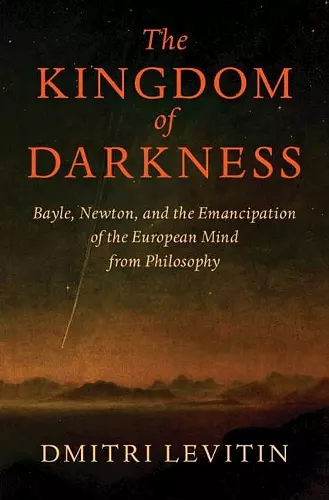The Kingdom of Darkness
Bayle, Newton, and the Emancipation of the European Mind from Philosophy
Format:Hardback
Publisher:Cambridge University Press
Published:31st Mar '22
Currently unavailable, and unfortunately no date known when it will be back
This hardback is available in another edition too:
- Paperback£39.99was £39.99(9781009695169)

This book chronicles the decline of speculative philosophy in Europe and reinterprets the contributions of Pierre Bayle and Isaac Newton, highlighting their roles in shaping modern knowledge.
In The Kingdom of Darkness, Dmitri Levitin provides a compelling exploration of early modern European intellectual history, focusing on the pivotal figures of Pierre Bayle and Isaac Newton. The narrative outlines how speculative philosophy, once central to European thought around 1500, gradually lost its prominence by 1700. This decline is intricately connected to the evolving landscape of knowledge, where natural philosophy began to separate from metaphysical concerns, and theologians increasingly favored philological approaches over philosophical ones.
Levitin delves into the structural factors that contributed to this significant transformation. He examines how historical and oriental scholarship influenced the understanding of the human mind's limitations, particularly in relation to ideas from China and Japan. This shift not only shaped the intellectual environment of the time but also framed the contributions of Bayle and Newton. Both thinkers emerged as products of this changing landscape, yet they also played crucial roles in facilitating its evolution.
Ultimately, The Kingdom of Darkness presents a genealogical vision of how philosophy was perceived as corrupting the human mind, a notion articulated by Thomas Hobbes. Bayle and Newton's efforts to combat this perceived corruption laid the groundwork for the new system of knowledge that emerged in the eighteenth century. Through meticulous research and analysis, Levitin offers fresh interpretations of these influential figures, shedding light on their lasting impact on Western thought.
'This truly monumental study calls for a Copernican revolution in our understanding of Modernity: the European Mind, Levitin argues, was not transformed by the triumph of philosophy but by emancipation from it. The evidence and acumen with which Levitin advances his bold thesis are extraordinary and will provoke debate for years to come.' Maria Rosa Antognazza, King's College London
'In his extraordinarily erudite and broad-ranging study, Levitin compels us to rethink historiographic categories such as the Scientific Revolution, the Enlightenment and the rise of modernity in Europe by charting the contingent historical conditions that prompted a momentous, yet overlooked, disciplinary reconfiguration of early-modern natural philosophy and theology; namely, the emancipation of both scientific and religious thought from traditional metaphysics and philosophical rationalism.' Niccolò Guicciardini, Università degli Studi di Milano
'This is one of the most important publications in European intellectual history, not just of this year, but of the last decade.' Noel Malcolm, Books of the Year 2022, Times Literary Supplement
'… Levitin makes a powerful case for the need to reconceptualize understanding of the Enlightenment and its subsequent history and influence on modern thought. The book is a paradigm of academic scholarship. The author's research and presentation are comprehensive and extensive … Essential.' D. B. Boersema, Choice
'… a remarkably erudite and important study with a highly intricate argument that requires slow and careful reading if one is fully to grasp its insights and nuances.' Daniel Woolf, Marginalia Review of Books
ISBN: 9781108837002
Dimensions: 236mm x 158mm x 56mm
Weight: 1530g
980 pages